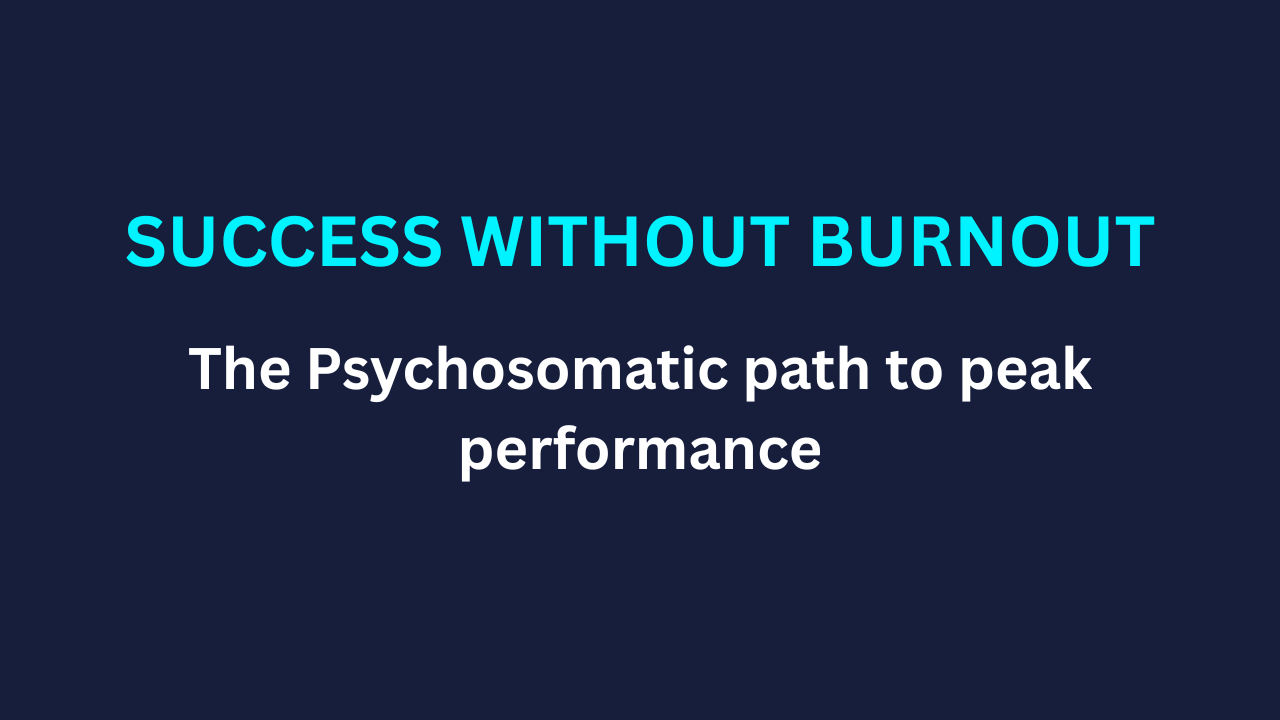
Success Without Burnout — The Psychosomatic Path to Peak Performance
We live in a culture that glorifies hustle. The narrative is simple: push harder, sleep less, sacrifice more — and success will come. Yet for many high-achievers, the cost of this approach is steep: chronic fatigue, anxiety, self-doubt, and burnout.
But what if success didn’t have to come at the expense of your well-being? What if peak performance could be achieved not through force, but through coherence between mind, body, and subconscious?
This is the promise of Psychosomatic Intelligence (PSI) — a method designed to help you achieve ambitious goals while preserving, even enhancing, your energy, clarity, and emotional health.
In this post, we’ll explore why the traditional hustle model fails, how PSI offers a sustainable alternative, and the actionable steps you can take to perform at your highest level without burning out.
The Problem with the Hustle Model
The hustle model is rooted in constant activation of the sympathetic nervous system — the fight-or-flight response. While this state can produce short bursts of productivity, living in it chronically leads to:
-
Adrenal fatigue
-
Cognitive fog
-
Poor emotional regulation
-
Sleep disturbances
-
Reduced creativity
Moreover, constantly overriding your body’s signals for rest trains your system to associate success with stress, perpetuating a cycle of burnout.
The PSI Approach to Peak Performance
PSI takes a radically different approach: instead of overriding the body, it teaches you to listen to it, regulate it, and align it with your conscious goals.
Here’s how PSI transforms the performance equation:
-
Nervous System Regulation for Sustainable Energy By engaging in practices that stimulate the parasympathetic nervous system — like breathwork, vagus nerve toning, and cold exposure — you maintain an internal state of calm focus. This ensures that energy is consistent and sustainable rather than erratic and depleting.
-
Subconscious Alignment to Eliminate Inner Conflict A large portion of burnout stems from inner friction — the subconscious beliefs that conflict with your goals (e.g., "Success is dangerous," or "If I slow down, I’ll fail"). PSI rewiring techniques like hypnosis, NLP, and parts work dissolve these conflicts, allowing your efforts to flow without internal resistance.
-
Embodied Goal Setting with NeuroGoals The NeuroGoal Sequence ensures that when you set a goal, it’s not just a mental exercise — it becomes anchored in your body and emotions. This creates a felt sense of alignment, reducing the stress that often accompanies big ambitions.
-
Rhythmic Workflows Aligned with Your Biology PSI encourages structuring your work in alignment with your ultradian rhythms — natural cycles of energy that last about 90-120 minutes. By working in focused sprints followed by deliberate recovery, you enhance productivity without taxing your system.
-
Positive Energy Practices Integrating practices that generate positive somatic energy — like movement, breathwork, sound healing, or mindful walks — keeps your emotional and physical energy vibrant, preventing the depletion that leads to burnout.
The Neuroscience of Sustainable Peak Performance
When you engage the PSI method, you optimize:
-
The prefrontal cortex for focus and strategic thinking
-
The amygdala for emotional regulation and threat reduction
-
The dopaminergic system for sustained motivation without addiction to short-term highs
-
The autonomic nervous system for energy regulation between activation and recovery
This integrated approach rewires your brain and body to handle pressure gracefully, sustaining high performance without exhaustion.
Conclusion: Redefining Success
Peak performance is no longer about grinding until you break. It’s about creating a state of psychosomatic coherence where your mind, body, and subconscious are synchronized.
With PSI, success becomes a natural extension of your internal alignment — not a fight against your own system.
If you’re ready to perform at your highest level without sacrificing your health, relationships, or happiness, it’s time to experience PSI.

